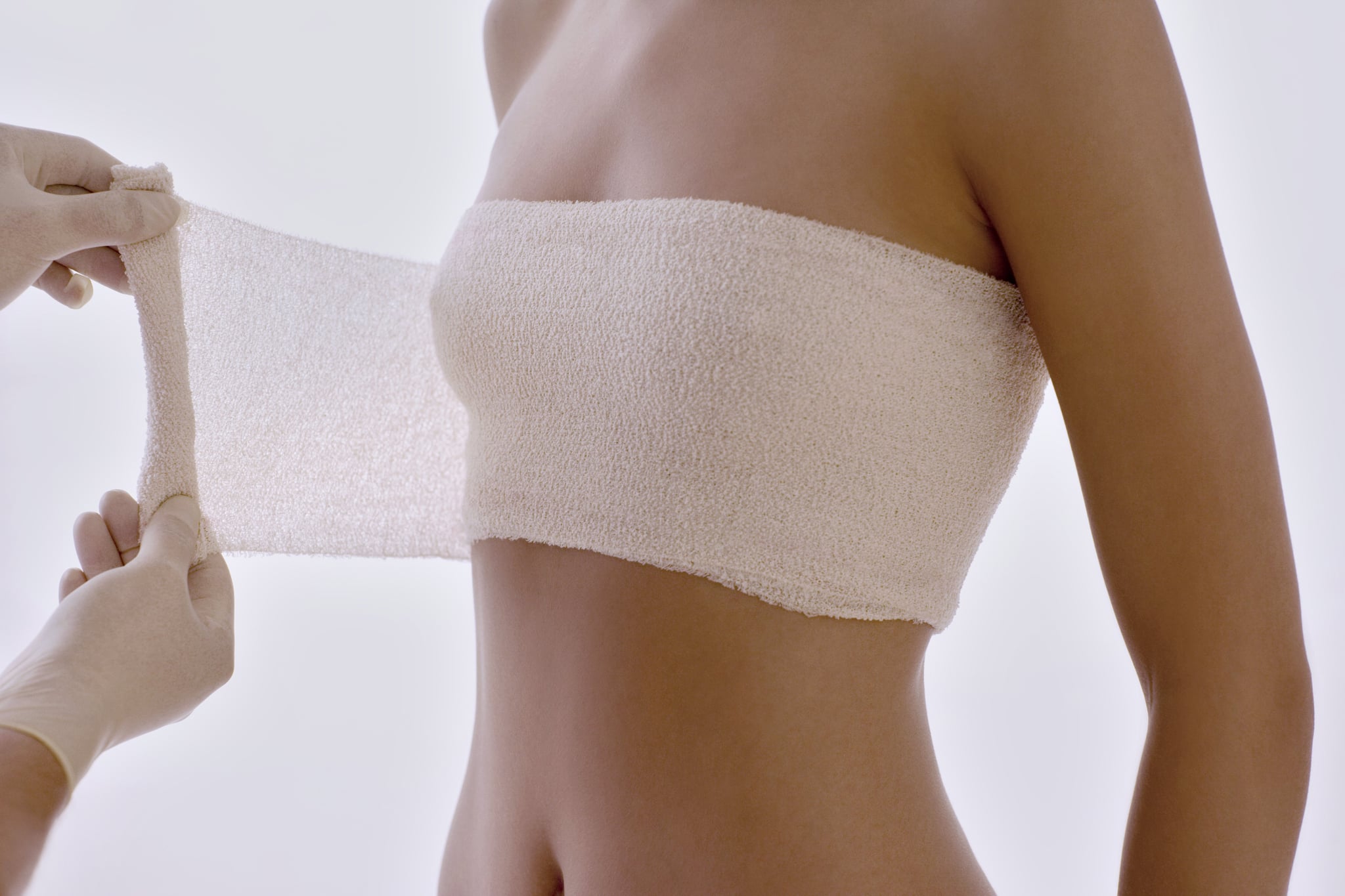Breast Reduction Surgery: Cost, Insurance, Before and Afters
Your Guide to Breast Reduction Surgery

Whether you're interested in getting a breast reduction for aesthetic reasons or because you're experiencing any kind of discomfort, it can be a life-changing surgery. The procedure is performed on people across all ages, starting at 18 — but you may also get it younger with parental consent. If you don't know where to start, you've come to the right place.
Just like with a breast augmentation, there are a number of reasons a breast reduction surgery might be right for you. "Common cosmetic reasons that a patient may choose to undergo breast reduction surgery are they feel their breasts are too large and don't fit their frame, they are self-conscious about them, or they want to feel more confident in their clothing," Smita Ramanadham, MD, FACS a double board-certified plastic surgeon, tells POPSUGAR. "Some may even find it difficult to exercise or participate in sports due to the size of their breasts."
On the other hand, there are also medically-necessary reasons for a breast reduction. "[It] can help resolve back, neck, [and] shoulder problems a patient may be experiencing such as pain, discomfort, shoulder grooving, and muscle spasm of the neck and trapezius muscles," says Jennifer Walden, MD, a board-certified plastic surgeon and the president of The Aesthetic Society.
No matter your reasoning, we have the answers to all the most common questions on the procedure. From just how much breast reduction surgery costs (and whether or not it's covered by insurance) to what you can expect during and after the surgery, keep reading to get some clarity from two plastic surgeons.
Breast Reduction Surgery Prerequisites
Like with all plastic surgery procedures, your breast reduction will start with a consultation. This preliminary meeting covers whether you're a good candidate for the surgery health-wise and whether the surgery is right for you overall. "A preoperative visit facilitates the lab work and other prerequisites that may be needed to ensure patients are in an optimal state of health with the lowest risk of complications," Dr. Walden.
In general, it's recommended that you're over the age of 18 years old and haven't had any breast growth for at least six months. "They may ask about medication use and smoking history," says Dr. Smita. "They will also assess your risk for breast cancer and may require a mammogram be performed based on these risk factors."
Should you be cleared for surgery, this is when the doctor will take before photos, provide an estimate on cost, and help you schedule it.
Breast Reduction Surgery Cost
Like any plastic or cosmetic procedure, the cost for a breast reduction varies depending on where you're located geographically and your specific surgeon. It also depends on whether or not your surgery is covered by insurance (more on that below). If you're paying for your breast reduction without insurance, you can expect to pay approximately $6,000 total, which is the reported average cost, according to the American Society of Plastic Surgeons.
Is Breast Reduction Surgery Covered By Insurance?
As we previously covered, there are two different categories of reasoning for seeking breast reduction: cosmetic and medical. If you're seeking surgery for cosmetic reasons, unfortunately, insurance will not cover it. A medically-necessary procedure, on the other hand, may qualify — but the process isn't easy.
"If you have symptoms from your large breasts, however, and are attempting to go through insurance, it's best to start your process with your primary care doctor or OB/GYN," says Dr. Smita. "They can best treat your symptoms and if no improvement is achieved, evaluation by a plastic surgeon is recommended."
If you're attempting to get insurance coverage for this procedure, you'll need to fit certain criteria and have a documented medical history of breast-related ailments. Even still, Dr. Walden says it used to be a bit easier to go through insurance for a medically-driven breast reduction, but that's no longer the case. "Historically, breast reduction procedures, especially those requiring up to one to two pounds of tissue being removed from each breast, were covered by insurance with the appropriately provided medical documentation," she says. Now, however, many third-party companies are declining to do so.
Breast Reduction Surgery Risks
As it goes with any plastic surgery procedure, there are a handful of risks associated with breast reduction. This includes your usual post-op bruising and scarring, as well as infection, and wound-healing complications associated with a lack of blood supply to the area. Additionally, Dr. Smita lists that "the main risks include asymmetry, loss of nipple sensation, nipple loss, [and] inability to breastfeed." Smokers experience an increased risk of these complications. If you're concerned about any of the aforementioned dangers, you should address them with your surgeon early on.
What to Expect During Breast Reduction Surgery
During your first or second meeting with your doctor, you'll go over your desired end result. "During a consultation for breast reduction surgery, your surgeon will ask about your goals for surgery, including ideal new size," says Dr. Smita.
On the day of the surgery, you should prepare to be at the hospital or operating centre for roughly six hours. After you're prepped for surgery and your doctor reviews your surgical plan with you, you'll be put under anesthesia and your plastic surgeon will get to work.
"After the procedure, an hour is typically needed for the patient's post-anesthesia recovery and caregiver instructions," says Dr. Walden. "They awake in a bra or ace wrap dressing with postoperative instructions." (More on those specific instructions later.)
Breast Reduction Surgery Before and After
Breast Reduction Surgery Recovery
The post-surgery instructions for a breast reduction are similar to other chest procedures. "This surgery is generally very well tolerated with minimal pain or discomfort," says Dr. Smita. "While patients are sent home with pain medications, most patients will stop their use within the first few days after surgery."
You may be sent home after your breast reduction surgery with drains to "gently rid you of any excess fluid after the surgery and sutures/surgical glue, which will need to be removed between weeks one to two, typically," says Dr. Walden.
It's recommended that you take two weeks away from work post-op, and for the first four to six weeks, you should restrict your activity. "Avoid overusing [your] arms, strenuous exercise, heavy lifting, and swimming or bathing submerged in water," says Dr. Walden. Walking, however, is encouraged immediately.
You won't be able to wear underwire bras for the first six weeks — instead, you'll be given a special, front-clasping post-op bra. At the six-week mark, you'll go back for a follow-up appointment. "Six months and even more so, one year postoperative is when the final results are seen best," says Dr. Walden.
Breast Reduction Scars
Your breast reduction surgery will leave you with a small scar that resembles an anchor. "They are present around the areolae extending vertically down the breast mound and end at the inframammary crease underneath the breasts," says Dr. Walden. "The way incisions heal and the consistency and coloration of a scar is based upon one's own genetics of healing and skin type, and scars take a good 12 to 18 months for fully fade, flatten, and mature."
These scars are permanent, but you can improve the appearance of your surgical scars by using products to help fade them during the healing process. "If indicated by a thickened or discolored scar, we employ the use of microneedling, profractional laser, broadband light, pigment lightening creams, steroid injections, [and] silicone compression strips," says Dr. Walden, but usually your body just needs time.







